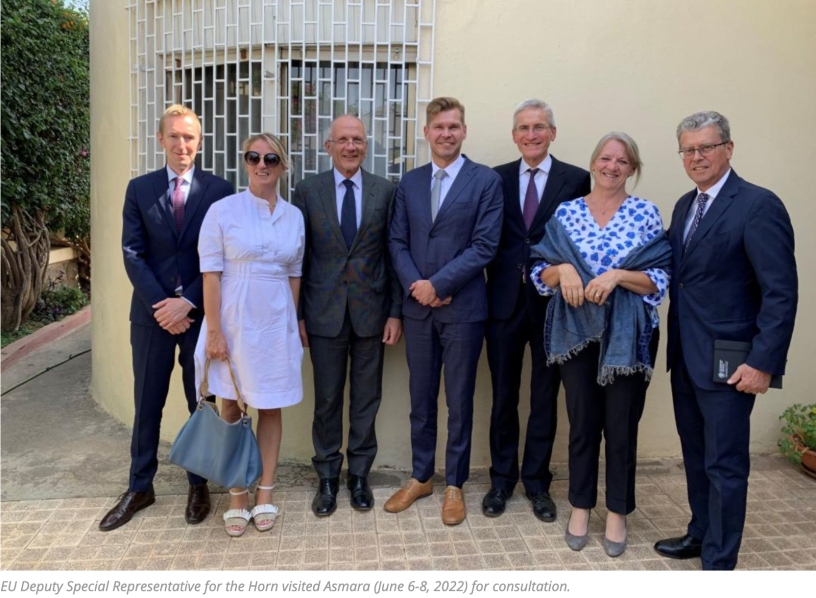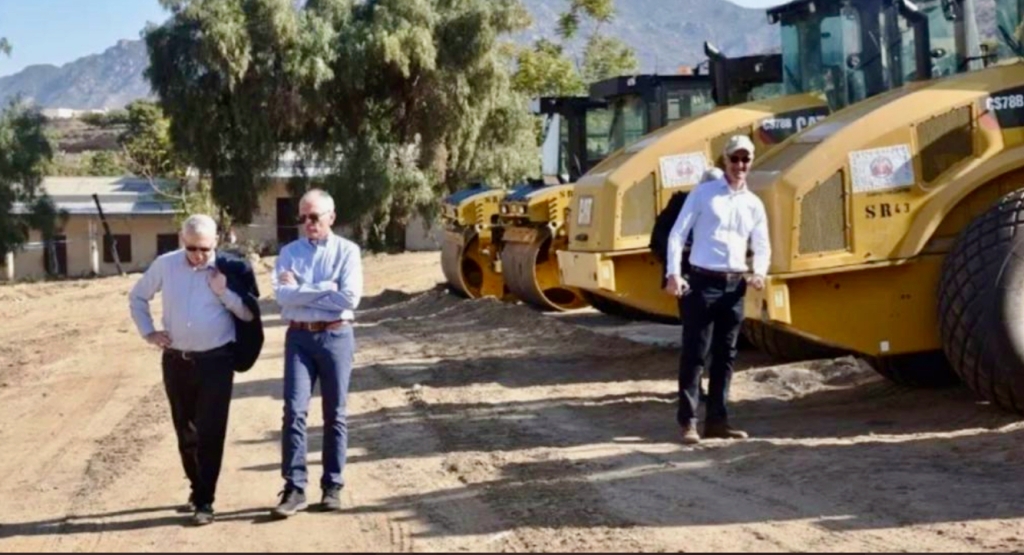Critical European Union discussions on Eritrea and Ethiopia to try to end the Tigray war
2022-06-21 20:44:09 Written by Martin Plaut Published in English Articles Read 2587 times
Discussions are due to get under way in Brussels today (Monday) which could shape the relations between the EU and the Horn of Africa for years.
Below, Human Rights Watch’s Laetitia Bader lays out what is at stake. The meeting comes after a visit to Eritrea by EU representatives at a higher level than has taken place for years.
It would appear that the EU is attempting a “reset” after abandoning its disastrous road building programme that used National Service conscripts in what amounted to slave labour. The EU promised to end the programme in September 2020.
EU and UK Ambassadors inspect Ethiopia-Eritrea Road, 2020
Today’s Brussels talks have got Ethiopia worried and they mobilised their diaspora, who have appealed to the EU not to increase sanctions against the Addis government.
Twelve Ethiopian Organizations wrote a letter to the European Parliament objecting to draft resolution (2021/2206 INI). [See below] They rejected the use of “Western Tigray” arguing that it is a Tigrayan term. And they are particularly worried about suggestions that there should be “an urgent deployment of an AU-led international peacekeeping force with a robust civilian protection mandate to Western Tigray,” to help end the war.
Clearly there are major sensitivities for all concerned, but the EU has been silent on the war in Tigray for far too long. Brussels needs to come up with a robust proposal that will support the AU/Kenyan mediation efforts to bring this tragic conflict to an end.
EU Should Press Ethiopia for Tangible Rights Progress
Today’s Brussels talks have got Ethiopia worried and they mobilised their diaspora, who have appealed to the EU not to increase sanctions against the Addis government.
Twelve Ethiopian Organizations wrote a letter to the European Parliament objecting to draft resolution (2021/2206 INI). [See below] They rejected the use of “Western Tigray” arguing that it is a Tigrayan term. And they are particularly worried about suggestions that there should be “an urgent deployment of an AU-led international peacekeeping force with a robust civilian protection mandate to Western Tigray,” to help end the war.
Clearly there are major sensitivities for all concerned, but the EU has been silent on the war in Tigray for far too long. Brussels needs to come up with a robust proposal that will support the AU/Kenyan mediation efforts to bring this tragic conflict to an end.
Government Should Ensure Access to Aid; End Arbitrary Detentions

 Ethiopians wait for food distribution in a small town north of Mekele, in the Tigray region of northern Ethiopia, May 7, 2021. © 2021 AP Photo/Ben Curtis © 2021 AP Photo/Ben Curtis
Ethiopians wait for food distribution in a small town north of Mekele, in the Tigray region of northern Ethiopia, May 7, 2021. © 2021 AP Photo/Ben Curtis © 2021 AP Photo/Ben Curtis
The future of European Union engagement in Ethiopia will be high on the agenda of EU foreign ministers gathering next Monday in Brussels. This meeting takes place 19 months into an armed conflict originating in the northern Tigray region that has been devastating for the civilian population.
The Ethiopian government in February lifted a state of emergency used to arbitrarily arrest thousands of Tigrayans, and since April has permitted greater numbers of aid convoys to enter Tigray. Still, abuses and suffering remain rife in northern Ethiopia. For nearly a year, the government has maintained an effective siege of Tigray, limiting food, fuel, and other critical supplies while also shutting off communications, banking, and electricity. While more aid has been allowed in, the amount remains far less than the population’s needs. The lack of drug supplies and services in particular means that people with chronic illnesses, along with survivors of abuses, including wartime sexual violence, do not have essential care.
Human Rights Watch in April released a report with Amnesty International documenting an ethnic cleansing campaign against Tigrayans by officials and security forces from the neighboring Amhara region. While the authorities restrict access to rights monitors and aid agencies, hundreds and perhaps thousands of Tigrayans are arbitrarily detained there in life-threatening conditions.
In a May 26 letter to the EU and member states, Human Rights Watch called for clear human rights benchmarks to underpin relations with the Ethiopian government. These include ending mass arbitrary detentions and allowing independent monitors’ access to detainees, the restoration of basic services, and unhindered and safe humanitarian access throughout conflict-affected areas.
There has been no meaningful accountability for war crimes and other serious abuses committed in Amhara, Tigray, and neighboring Afar regions. Government investigative processes and outcomes lack transparency, and international investigations continue to be hampered.
Federal authorities have for years conducted mass arrests and prolonged arbitrary detentions in Oromia, and have more recently detained thousands in Amhara.
For EU pressure to carry weight, the focus needs to be on ending harm to civilians. Diplomatic engagement and access with Ethiopia’s government should not be an end in itself, but a tool to achieve tangible progress in protecting civilians countrywide.
As the world watches the EU take robust measures against those responsible for war crimes elsewhere in the world, it shouldn’t settle for less in the Horn of Africa.





















